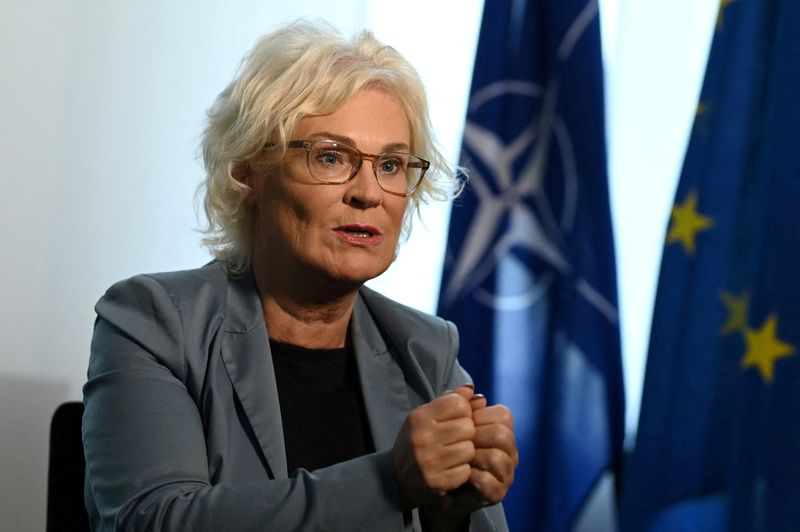Moscow’s military reserves may be smaller than initially assumed – German defence minister
2022.09.16 09:22
[ad_1]

© Reuters. FILE PHOTO: German Defense Minister Christine Lambrecht speaks during an interview with Reuters at the Federal Ministry of Defence in Berlin, Germany September 14, 2022. REUTERS/Annegret Hilse/File Photo
By Sabine Siebold and Sarah Marsh
BERLIN (Reuters) – Russia has suffered significant troop and equipment losses in Ukraine and the impact of Kyiv’s latest counter-offensive may reveal Moscow’s military reserves to be smaller than assumed, Germany’s defence minister told Reuters.
Russian President Vladimir Putin has yet to comment publicly on the setback suffered by his forces this month. Ukrainian officials say 9,000 sq km (3,400 sq miles) have been retaken, territory about the size of the island of Cyprus.
“Russia’s military has suffered significant losses by now – both in troops and equipment,” Defence Minister Christine Lambrecht said in an interview conducted on Wednesday and published on Friday.
“The notion that the Russian forces have virtually unlimited military means at their disposal … is not matched by reality,” she added, noting Russia needed to repair a lot of equipment and was having a hard time recruiting enough new personnel.
“It will be very interesting to see how large the remaining reserves of the Russian military actually are. I think it’s significantly less than we probably initially thought,” Lambrecht said.
“Nevertheless, one should not be mistaken: Russia is far from defeated and still has various military options.”
At the same time, Lambrecht praised the courage of Russians voicing public criticism of Putin, even though, she said, she did not expect the dissent to be sufficient to cause Putin’s fall in the short term.
“When you see what a system of intimidation Putin has quite consistently constructed over recent years, it is very impressive when people in Russia voice their criticism so openly,” she said.
“But I don’t have the impression that this criticism has reached an extent that would lead to Putin’s imminent downfall,” the minister added.
“I can understand the hope but I don’t see it happening yet. Of course, I hope that this criticism will encourage others to speak up as well.”
In rare expressions of public dissent at a time when Russians risk heavy prison sentences for “discrediting” the armed forces or spreading “deliberately false information” about them, several local politicians lately have called for Putin to be sacked over the Ukraine war.
Lambrecht said Berlin was ready to support Kyiv long-term.
Ukraine has been pushing Berlin for months to supply Kyiv with more heavy weapons, and to start delivering modern Western tanks as well, a demand German Chancellor Olaf Scholz has rejected repeatedly.
On Thursday, Lambrecht pledged the delivery of additional multiple rocket launchers, rockets and armoured personnel carriers to Kyiv, but not the tanks the country has been demanding.
Asked whether she expected the German population to continue backing Russian sanctions in the upcoming winter, despite soaring energy prices and a sky-rocketing inflation, Lambrecht said the government needed to make clear that it would address the existential concerns of people in Germany.
“Of course, we cannot offset everything,” she said. But “if we can do that (address the existential concerns), then I am sure that the support of the people here in the country for Ukraine will remain strong.”
[ad_2]
Source link








